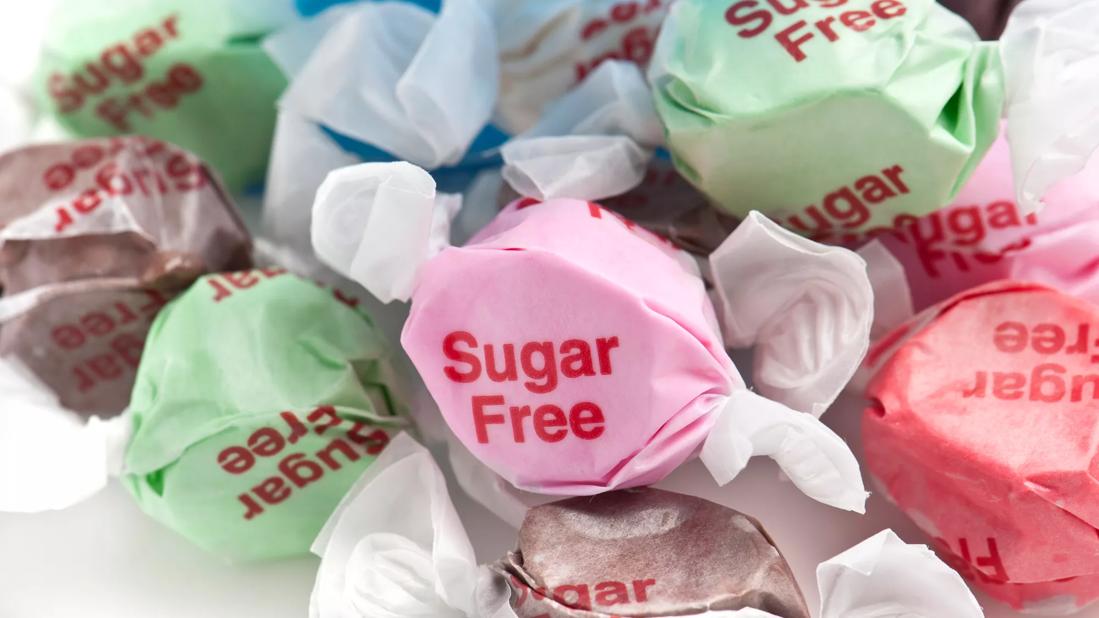Sugar-free or not, you need to monitor your intake

Image content: This image is available to view online.
View image online (https://assets.clevelandclinic.org/transform/05c8c585-ce58-4d5f-bcf8-d982e4cedbe7/SugarFreeCandy_jpg)
Image of wrapped candies with sugar-free written on them
If you have diabetes you may feel like sugar is your enemy. But when you have a hankering for something sweet, is sugar-free candy a healthy option?
Advertisement
Cleveland Clinic is a non-profit academic medical center. Advertising on our site helps support our mission. We do not endorse non-Cleveland Clinic products or services. Policy
In this Q and A, registered dietitian Anna Taylor, MS, RD, LD, CDE,answers our questions and discusses what you need to know about sugary treats and other foods that use sugar substitutes.
A: About 90 percent of your diet should focus on healthy foods like fruits, vegetables, beans, whole grains, poultry and fish. There is wiggle room in a healthful diet for treats like sweets whether you have diabetes or not. That is where candy would fit.
You should enjoy your food — and food also has social, emotional and physical health benefits. Built into the recommended dietary guidelines is room for getting up to 10 percent of your calories from sugar every day.
Treats affect your blood sugar. So if you have diabetes, it’s important to focus on portion control and moderation when you select these foods.
In other words, you can eat treats even if you have diabetes. But you need to account for the carbohydrate and calorie content they provide in your diet whether they are sugar-free or not.
A: Everyone with diabetes is different, but here’s what the American Heart Association recommends:
Advertisement
A: Some sugar substitutes contain carbohydrates, while others do not. All carbohydrates turn into sugar in the body, leading to elevated blood sugar levels. You have to read the nutrition facts label to know whether a product contains carbohydrates.
It’s true that sugar alcohols such as sorbitol, xylitol, and mannitol, don’t affect blood sugars as dramatically as other carbohydrates do. So sugar-free candy with most of the total carbs coming from these alcohols will typically have less impact on your blood sugar.
Many of those who have type 2 diabetes do well with an intake of 30 grams to 45 grams of carbs per meal (for women) and 45 to 60 grams per meal (for men), and snacks with no more than 20 grams of carbs. See a registered dietitian for individualized recommendations.
A: There are several, including:
A: There are several possible benefits, including:
A: Sugar alcohols can cause adverse gastrointestinal symptoms such as bloating, abdominal pain, gas and diarrhea. So it’s a good idea to stick to the serving size recommendations.
Some studies suggest that certain zero-calorie sweeteners may also stimulate appetite, which can be counterproductive for someone who is trying to watch their weight.
The bottom line: Most people can enjoy treats — with or without sugar — as part of a healthy diet. If you have questions about sugar or carbohydrate intake, consult your doctor or a dietitian.
Advertisement

Delivered every Tuesday!
Sign up for our Health Essentials emails for expert guidance on nutrition, fitness, sleep, skin care and more
It's a letter about the news!
Learn more about our editorial process.
Advertisement
There are better breakfast options, but if it’s got to be cereal, look for whole grains, high fiber and no added sugar
A diabetes diagnosis, new or long-standing, can trigger reactions like grief, stress, depression and frustration, but symptom relief and help are available
Type 1 diabetes happens when your body doesn’t make insulin, while Type 2 happens when your body can’t use insulin properly
There is an indirect link between the sweet substance and the condition
The short answer: Yes, but you need to eat it in moderation and keep track of how much you consume
Blood glucose monitoring and drinking in moderation can help you avoid hypoglycemia
Sweet potatoes are great, but sweetened drinks aren’t so great
Some sweeteners may have health risks, so it’s best to keep your intake moderate
Type 2 diabetes isn’t inevitable with these dietary changes
Applying a hot or cold compress can help with pain
Pump up your iron intake with foods like tuna, tofu and turkey